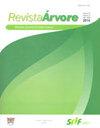MORPHOLOGICAL DESCRIPTORS FOR THE CHARACTERISATION OF TEAK CLONES CUTTINGS (Tectona grandis L.F.)
IF 0.8
4区 农林科学
Q4 FORESTRY
引用次数: 0
Abstract
ABSTRACT Teak (Tectona grandis) is a forest species cultivated in tropical regions worldwide, due to the traits of its wood and its great economic value on the market. In Brazil, original plantations are being replaced by selected clonal forests, which generate the need and interest to protect this genetic material based on the current legislation. The legal requirements for cultivar protection are that the genotype must result from genetic improvement and provide distinguishability, homogeneity, and stability (DHS). This work identifies morphological descriptors in teak cuttings to assist the clone protection process of the species. The study was conducted in a completely randomized design with the evaluation of 7 clones and 15 cuttings per clone, at 30, 60, 90, and 120 days old. The information was also organized based on the arrays of presence and absence of variations for each clone, for 21 morphological traits. Subsequently, genetic similarity measures were estimated using the Jaccard index and the UPGMA clustering method. The clones with the 12, 7, 9, and 11 morphological traits formed the morphological descriptors for the 30, 60, 90, and 120 days old cuttings, respectively. The traits of the leaf blade: length, width, length/width ratio, green intensity, and the brightness of the leaf, were common for all the evaluated ages, but their respective levels of expression were different.柚木无性系扦插(Tectona grandis L.F.)的形态描述符
柚木(Tectona grandis)是一种在世界热带地区种植的森林物种,由于其木材的特性和在市场上的巨大经济价值。在巴西,最初的种植园正被选定的克隆林所取代,这就产生了根据现行立法保护这种遗传物质的需求和兴趣。品种保护的法律要求是,基因型必须由遗传改良产生,并提供可区分性、同质性和稳定性(DHS)。这项工作确定了柚木插条中的形态描述符,以帮助该物种的克隆保护过程。该研究以完全随机设计进行,在30、60、90和120天龄时对7个克隆和每个克隆15个插穗进行评估。还基于每个克隆的21个形态性状的变异存在与否的阵列来组织信息。随后,使用Jaccard指数和UPGMA聚类方法估计遗传相似性度量。具有12、7、9和11个形态特征的克隆分别形成了30、60、90和120天龄插条的形态描述符。叶片的特征:长度、宽度、长宽比、绿色强度和叶片亮度,在所有评估年龄段都是共同的,但它们各自的表达水平不同。
本文章由计算机程序翻译,如有差异,请以英文原文为准。
求助全文
约1分钟内获得全文
求助全文
来源期刊

Revista Arvore
FORESTRY-
CiteScore
1.00
自引率
0.00%
发文量
32
审稿时长
4-8 weeks
期刊介绍:
A Revista Árvore é um veículo de comunicação científica da Sociedade de Investigações Florestais – SIF. O jornal é de acesso gratuito, revisado por pares, que publica bimestralmente trabalhos científicos originais no campo da Ciência Florestal. As áreas temáticas para publicação são: Ambiência e Conservação da Natureza, Manejo Florestal, Silvicultura e Tecnologia da Madeira e Utilização de Produtos Florestais.
A política editorial visa manter alta conduta ética em relação à publicação e aos seus funcionários, rigor na qualidade dos artigos científicos, seleção de revisores qualificados, respeito profissional aos autores e processo de tomada de decisão imparcial. A Revista Árvore publica artigos apenas em inglês.
Artigos de revisão podem ser publicados se houver uma discussão relevante resumindo o estado da arte sobre o assunto. A revisão estrita da literatura não é aceita.
 求助内容:
求助内容: 应助结果提醒方式:
应助结果提醒方式:


